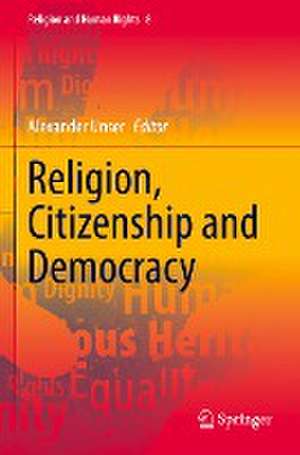Religion, Citizenship and Democracy: Religion and Human Rights, cartea 8
Editat de Alexander Unseren Limba Engleză Paperback – 5 ian 2023
Experts contributing from sociology, political science, theology, and educational science look at the impact of religious beliefs and practices on democratic attitudes and behavior. Chapters also concern how religion influences the recognition of others as citizens. The text appeals to graduates and researchers in these fields with a secondary market for the general interest reader.
| Toate formatele și edițiile | Preț | Express |
|---|---|---|
| Paperback (1) | 889.43 lei 6-8 săpt. | |
| Springer International Publishing – 5 ian 2023 | 889.43 lei 6-8 săpt. | |
| Hardback (1) | 895.45 lei 6-8 săpt. | |
| Springer International Publishing – 4 ian 2022 | 895.45 lei 6-8 săpt. |
Preț: 889.43 lei
Preț vechi: 1084.67 lei
-18% Nou
Puncte Express: 1334
Preț estimativ în valută:
170.25€ • 184.99$ • 143.10£
170.25€ • 184.99$ • 143.10£
Carte tipărită la comandă
Livrare economică 21 aprilie-05 mai
Preluare comenzi: 021 569.72.76
Specificații
ISBN-13: 9783030832797
ISBN-10: 3030832791
Pagini: 274
Ilustrații: VI, 274 p. 6 illus., 1 illus. in color.
Dimensiuni: 155 x 235 mm
Greutate: 0.4 kg
Ediția:1st ed. 2021
Editura: Springer International Publishing
Colecția Springer
Seria Religion and Human Rights
Locul publicării:Cham, Switzerland
ISBN-10: 3030832791
Pagini: 274
Ilustrații: VI, 274 p. 6 illus., 1 illus. in color.
Dimensiuni: 155 x 235 mm
Greutate: 0.4 kg
Ediția:1st ed. 2021
Editura: Springer International Publishing
Colecția Springer
Seria Religion and Human Rights
Locul publicării:Cham, Switzerland
Cuprins
Chapter 1. Religion, Citizenship and Democracy: A theoretical and methodical framework for future research (Unser).- Chapter 2. Are religious people better democratic citizens? (Ziebertz).- Chapter 3. Democratisation as a professional task? Pastors of the Protestant Church in Germany and their public role (Menzel).- Chapter 4. No citizenship for Ruth? (Ostmeyer).- Chapter 5. The Income Inequality Gap and its Effect on Citizenship, Democracy, and Religion (Webb).- Chapter 6. Religion, democracy and citizenship – exploring the relations among Swedish youth (Sjöborg).- Chapter 7. Relationship between religion, citizenship and democracy among youths: a case of Tanzania (Fumbo).- Chapter 8. Judaism and Citizenship: The Attitudes of Religious Female Adolescents in Israel to Democracy (Gross).- Chapter 9. Attitudes toward religion and democracy among young people in Pakistan and Palestine (Webb).- Chapter 10. Religious Worldviews, Citizenship and Social conviviality in Malta (Gellel).- Chapter 11. Ridiculing of religious minorities in the media - part of a new xenophobic worldview? (Botvar).- Chapter 12. Countering anti-Jewish attitudes among Christian and religiously unaffiliated youth – Testing the contact hypothesis (Francis).- Chapter 13. Metaphoric perceptions of political immigrants towards the concept of citizens (Ozdemir).- Chapter 14. A qualitative and comparative study on the views and practices of primary school teachers in Germany and Turkey to the teaching of the concept of democracy (Kaya).- Chapter 15. Educating for civil society and democracy in non-formal programs of religious education – the example of confirmation work (Schweitzer).- Chapter 16. Democratic and citizenship education at faith-based schools. Conceptual deliberations and empirical insights (Pirner).- Chapter 17. Attempting a connection between teenagers’ religious consciousness and citizenship education in the Greek educational system (Potamousi).- Chapter 18. Normative Citizenship Educationin Plural Societies (Avest).- Chapter 19. Education in the face of Communalism and Cosmopolitan Citizenship (Anthony).
Notă biografică
Since 2019, Dr. Alexander Unser works as an Assistant Professor at the Faculty for Humanities and Theology at TU Dortmund University. His research focusses on religion and human rights, religion and citizenship, and interreligious learning.
Textul de pe ultima copertă
This innovative volume is focused on the impact of religion on the realization of democratic citizenship. The researchers contributing provide empirical evidence on how religion influences attitudes towards citizenship and democracy in different countries. The book also tackles the challenges and opportunities for citizenship education.
Experts contributing from sociology, political science, theology, and educational science look at the impact of religious beliefs and practices on democratic attitudes and behavior. Chapters also concern how religion influences the recognition of others as citizens. The text appeals to graduates and researchers in these fields with a secondary market for the general interest reader.
Experts contributing from sociology, political science, theology, and educational science look at the impact of religious beliefs and practices on democratic attitudes and behavior. Chapters also concern how religion influences the recognition of others as citizens. The text appeals to graduates and researchers in these fields with a secondary market for the general interest reader.
Caracteristici
Provides empirical evidence on the impact of religion on citizenship in Christian, Muslim, Jewish, and secular societies Brings together a group of esteemed scholars debating the importance of religion for citizenship education Appeals to graduates and researchers in these fields with a secondary market for the general interest reader









